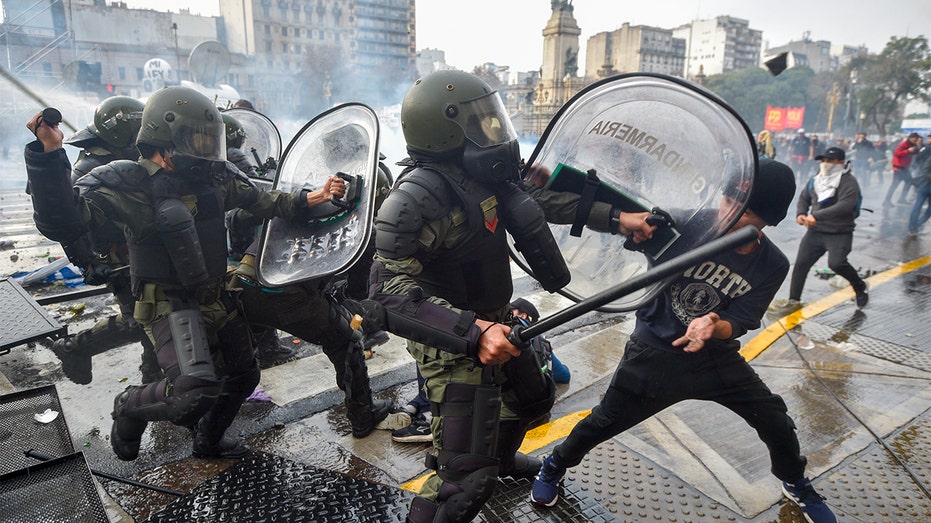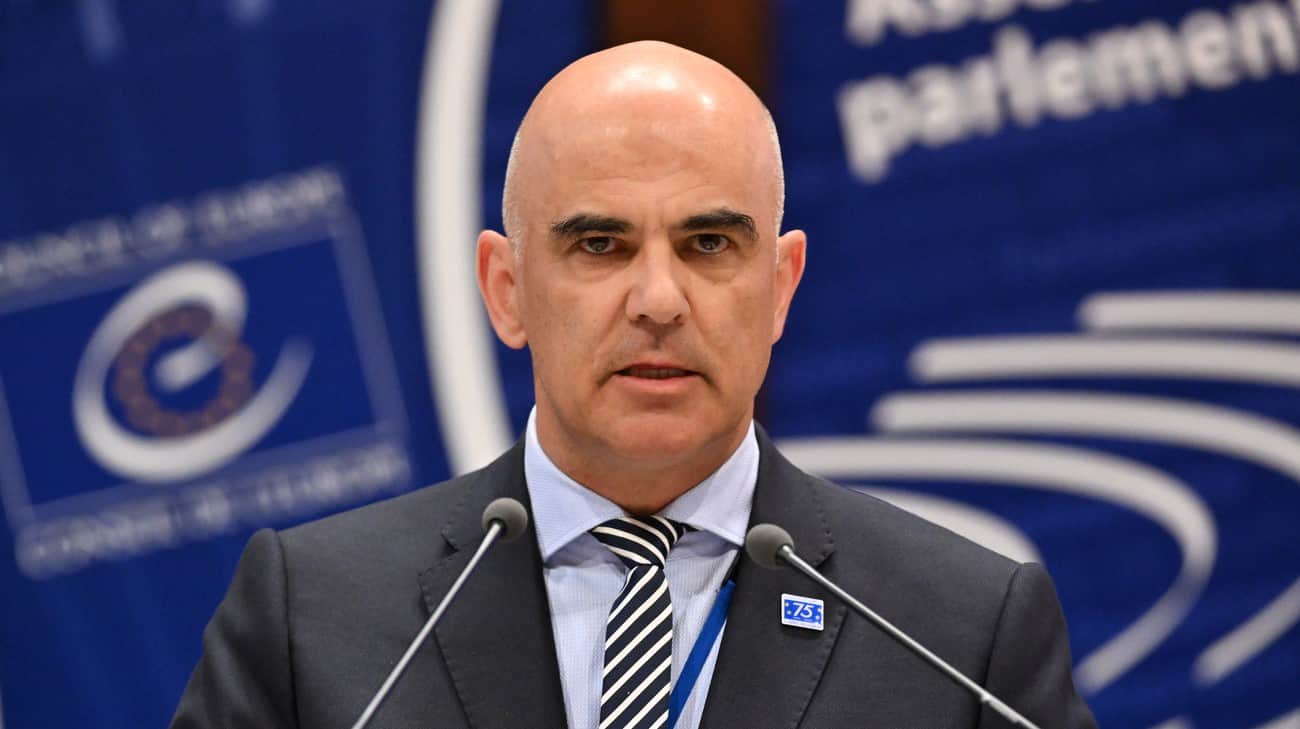Riot police unleash tear gas, water cannons on rowdy anti-Milei protesters in Buenos Aires
Riot police converged in downtown Buenos Aires, Argentina, on Wednesday to disperse aggressive protesters of policies brought forth by libertarian President Javier Milei.

Argentine riot police unleashed water cannons and tear gas to disperse protesters who threw sticks, stones and Molotov cocktails outside Congress on Wednesday, escalating tensions before lawmakers were to vote on state overhaul and tax bills proposed by President Javier Milei.
The vote is the most serious test to date of the libertarian leader’s vision of governance and change.
Thousands of demonstrators had converged in downtown Buenos Aires as the Senate opened debate on the key legislation, urging lawmakers to reject Milei’s program of harsh austerity and economic deregulation.
ARGENTINA COURT POSTPONES THE START OF A TRIAL IN A CRIMINAL CASE INVOLVING THE DEATH OF MARADONA
The carnival atmosphere that prevailed around Congress earlier in the day — with protesters blasting trumpets, dancing and buying beer and grilled meat from impromptu street barbecues amid — quickly turned as crowds jostled and shoved against a column of police armed with shields and batons.
Security forces backed by armored cars with mounted water cannons pushed back protesters hurling flaming bottles and other objects. Despite the wintry weather, hundreds of police blasted water cannons and tear gas at crowds that surged toward cordoned-off streets, and at one point, trampled over a police barricade.
Ensuing scuffles between police and protesters injured at least 20 officers, authorities said. Security forces said they arrested 15 people.
Scenes of chaos played out in streets surrounding the central square. Protesters threw Molotov cocktails at bikes and set ablaze a car belonging to a local radio station alight. Police used pepper spray to clear a line of demonstrators, sending at least four opposition lawmakers to the hospital, according to the left-wing Peronist party Unión por la Patria.
The presidency issued a statement condemning the protesters as "terrorists" who "tried to mount a coup d’état by attacking the normal functioning of the Argentine National Congress."
"The only thing the old guard knows how to do is put spokes in the wheel," Milei said Wednesday a conference for a right-wing think tank at the Hilton Hotel in Buenos Aires. "We are going to change Argentina, we are going to make it the most liberal country in the world."
Violence outside Congress prompted a shouting match inside as opposition senators tried to pass a motion to pause the debate because of the clashes. The motion failed and debate continued.
Milei rose to power on the promise he would solve Argentina’s worst economic crisis in two decades, but his political party of relative novices holds a tiny minority of seats in Congress and he has struggled to strike deals with the opposition.
Senators began debating two bills on Wednesday, a tax package that lowers the income tax threshold and a 238-article state reform bill, initially dubbed the "omnibus bill" because of its then more than 600 articles.
This watered-down version still delegates broad legislative powers to the president in energy, pensions and security, and includes measures to incentivize investment, deregulate the economy and trim the deficit.
"Thy seek to bring our national industry to bankruptcy for the benefit of some monopolies," Peronist lawmaker Juan Marino said of a divisive incentive scheme for investments in the bill.
Certain touchy subjects, such as unions’ provision of health care and the privatization of Argentina’s national oil company, have been scrapped in hopes of reaching a compromise.
"If this law passes, we are going to lose so many of our labor and pension rights," said 54-year-old primary school teacher Miriam Rajovitcher, saying that already her school budget has been slashed, her wages have been cut and food prices have skyrocketed. "I am so much worse off."
Launching fireworks and chanting, "Our country is not for sale!" bankers, teachers, truckers and workers from a slew of other trade unions held signs mocking Milei for his self-proclaimed "anarcho-capitalist" agenda and drastic efforts to slash spending across the state. "How can a head of state hate the state?" one banner read.
After weeks of torturous negotiations to win over potential allies, Milei’s two major bills cleared an important hurdle in late April, passing the lower house of Congress. If the Senate passes the bills with modifications, the lower house still has to approve them.
"Today, it’s almost more important for Milei to demonstrate that he can pass laws in Congress than what he passes," said Lucas Romero, director of Synopsis consultancy.
The package faces stiff resistance from right-wing moderates and the left-leaning Peronist movement loyal to former president Cristina Fernández de Kirchner, which has dominated Argentine politics for two decades.
The Peronist bloc controls 33 out of 72 seats in the Senate while Milei’s party, Freedom Advances, holds just seven. The bill needs 37 votes in the Senate to get a majority.
Analysts say foreign investors and the International Monetary Fund, to which Argentina owes a staggering $44 billion, are closely watching the vote to see whether Milei can build consensus with his opponents to deliver on his ambitions.



